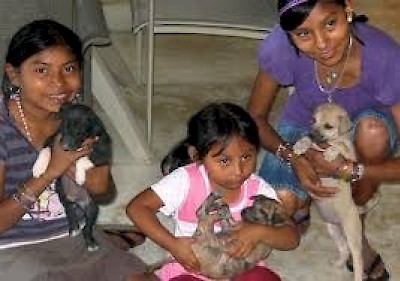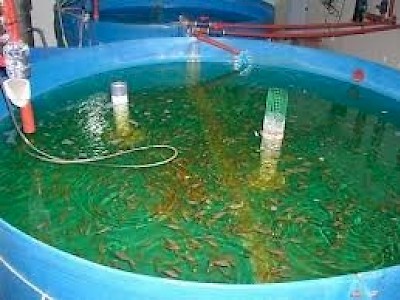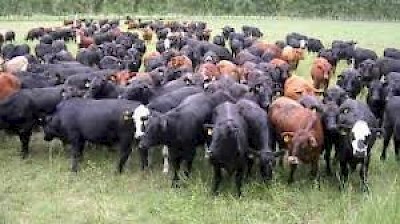Yucatan News: Traditional Medicine
New Category of Foreign Adoptions by U.S. Citizens
Sometimes, children are not adopted because of their age (over the age of three) or have any medical condition (any age). This new category seems to be a pseudo-adoption, in that it will be a formal guardianship that will remain under the supervision of the state. Otherwise, all of the normal processes associated with adoption, including financial and home studies, will be followed. There are no numbers given as to how many children will be available under this guardianship program, but there are currently 70 disabled children living at the Center for Comprehensive Care for the Child in Distress in Yucatan. This program is available only to U.S. citizens and opens the door to finding a family for children who, until now, had little hope of doing anything more than aging out of the system.
Research Collaboration Funded with Texas A&M
The State of Yucatan and Texas A&M University have signed and funded a collaborative relationship to develop engineering, research, and technology projects together. The State of Yucatan and Texas A&M are each contributing half of the initial $200,000 USD in funding for the initiative. Projects include emerging technologies to deal with beach erosion, early warning systems for forest fires, dealing with local disasters such as hurricanes, and better management of water and other natural resources. The Governor of Yucatan traveled to the Texas A&M campus in College Station to sign the papers and it looks as if the Aggies will be in Merida soon. Since we have a rather large number of Texas expats in this area, they can look for a warm welcome.
Fifth Convention of Traditional Medicine Practitioners in Maxcanu
This annual conference is sponsored by the Institute for the Development of the Mayan Culture (Indemaya). This year, it was attended by 65 Maya midwives. One thing that impressed us about what came out of this convention is that the conference has decided to be sure to let the public know who these ladies are and where they are. For the most part, they live in Maxcanu, Abala, Tetiz, Halacho, Kopoma, Samahil, Chochola, Kinchil, and Celestun. If you live or vacation near any one of those municipalities, do keep an eye out for them. The other issue they addressed was the importance of protecting the Mayan language. With that combination of language security and traditional medicine knowledge, it should not be difficult for the culture of the Maya to survive well into the future.
Alcoholics Anonymous Regional Conference
More than 1,400 members of AA are currently attending a three day regional convention in Merida. One of their biggest concerns is the rise in alcoholism rates among women. Yucatan Living would like to remind expats and potential expats that there are local AA meetings in Merida (at the Merida English Library) and in Progreso every week. If you would like to attend a meeting, please check Yucatan Living’s Ongoing Events page for times and locations.
DNA Yucatan: Genetic Profile Research
There is a new project underway whose purpose it is to discover what the ethnicity of an average Yucateco really is. Individuals often identify themselves as Yucatecos, then add that they are Mayan, or Korean, or Lebanese. The list goes on to include French, German, Spanish and more. Yes but… what nationalities does the DNA of the average Yucateco include? This project is beginning with a little blood sample of 200 people born in Yucatan (one per family please). We are fairly certain the research will continue to a larger sample but, for now, 200 individuals – each from a different family – should give researchers an idea of the genetic makeup of the average Yucateco. We suspect he or she will be, to their surprise, a mixture of quite a few of the more common immigrant groups. If you know someone who would like to participate in this project, tell them that donors can go, Monday through Friday, from 9:00 AM to 5:00 PM, to the facilities of Labratorio Genetica, located in the FGE complex on the Periferico Poniente.
Merida Set to Grow Up
The new Condominium Property Act has been sent to the State Congress for approval. It seems that the city can count on more tax money coming in from a condo building than it can from a single dwelling house with a big yard in Merida. This will mean stricter construction laws, and a whole host of other issues. Whether it is good for the future of the city – long-term – or not will remain to be seen. If you have an opinion on this issue, we would like to hear it. Please leave us a comment at the bottom of the page.
The Rise and Fall of Lemons
Six months ago, the price of yellow lemons was $60 pesos per kilogram (2.2 pounds). Today, the price has fallen to two pesos per kilogram. Since farmers have to irrigate lemons six hours a day, keep them free of pests and diseases, pick them, and transport them to market, two pesos per kilo is not nearly enough to pay for growing them. Green Persian limones are selling, at the point of origin, for $15 pesos for a 20 kg. box. This price is also not sustainable and is especially disheartening when the farmers are aware of the markups in the cities. According to the citrus producers’ association, there is now a serious overproduction situation in southern Yucatan. This comes on the heels of $38 million pesos that have just gone into bringing technology to farmers so they can improve the volume of their crops. Farmers are asking that housewives include more fruit on their family table to ensure a better price for upcoming orange and other fruit crops.
Great News in Aquaculture Research in Progreso
For many years, the need for food has had producers and environmentalists at odds with each other, no area more so than in the field of aquaculture. Any group of animals will develop diseases when confined in large numbers for their entire lives. This has been the problem with farming shrimp in the sea. The shrimp develop diseases that not only affect their lives, but the quality of the sea around them. This leads to damage to the lives of both animals and humans, and then to negative pressure on the aquaculture industry itself. Those days could soon be over. Research has been ongoing in the scientific community at Progreso that has identified the genes that trigger an immune-response in shrimp. The scientists intend to continue their research, but will soon put their findings in a public database so that researchers around the world can obtain information about how to keep shrimp healthy in aquaculture environments. This is wonderful news for the researchers, the shrimp, the environment, and for the human beings who will soon not have to worry about how and where the shrimp they purchase were grown.
Sympathy, Prayers and Condolences
Yucatan Living would like to offer our heartfelt sympathy, prayers and condolences to the families of Pedro Melchor Herrera Cirerol and Jose Carlos May Reyes. Both young men lived in Progreso. Jose, age 27, was killed by lightning while playing soccer in the rain. The game had already been called “due to rain” and the players were leaving the field when lightning struck. Benjamin Graniel Chalet, age 36, was also injured in this incident. In another tragedy, Pedro, age 21, at this writing, is in intensive care after being struck by an SUV while riding his bike. The driver left the scene and has not yet been found. Pedro is an upper level student in electro-mechanics at the Instituto Tecnológico Superior Progreso (ITSP). While controversy surrounds the incident and its aftermath, our thoughts and prayers are with the families of both Jose Carlos May Reyes and Pedro Melchor Herrera Cirerol.
Cattle Stock Continues to Improve: Annual Livestock Sale
Every year, there is a cattle sale, in Tizimin, that is subsidized by the state government. This is to enable small ranchers to purchase better quality animals with which to improve their herds. This year, the goal was to see 30 new animals (Simbrah, Nelore, Beef Master, Braunvieh, and Red Brangus) sold to ranchers across the state. The genes of these fine animals can now be found in San Felipe, Merida, Dzilam Gonzalez, Valladolid, Kinchi, Panaba, Chemax and Temozon. Yucatan’s beef producers have taken on a new sense of pride over their herds in the past few years and the quality of beef they produce has improved dramatically.










